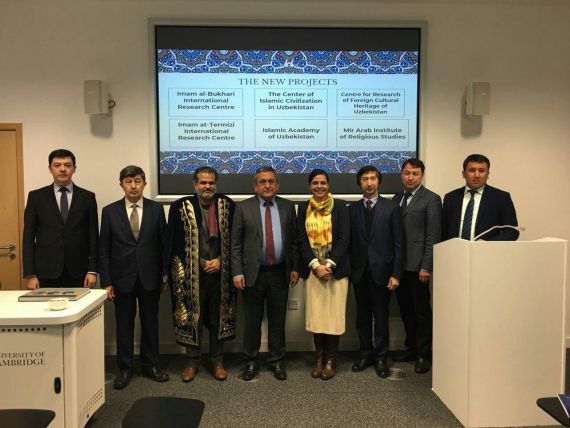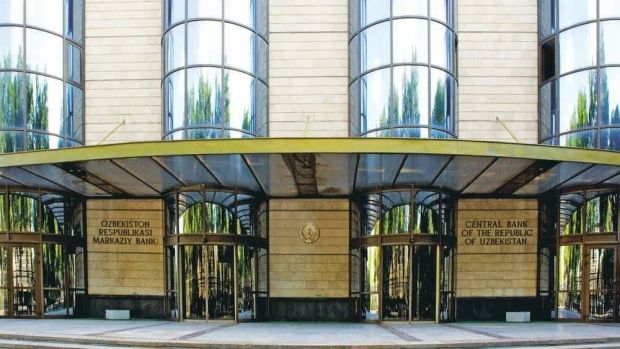Tashkent city



As it was informed earlier, a group of scholars on Islamic and oriental studies have visited Oxford and later Cambridge University. They met with professors and discussed future research perspectives.
Partnership agreements between Central Asian Forum of Cambridge University and Center for Islamic Civilization, Imam Buhari scientific-research center, The Center for research on Uzbek cultural heritage abroad and Tashkent Islamic University were signed.
According to the agreement scholars from Cambridge University are expected to provide lectures at Islamic Academy of Uzbekistan and Tashkent Islamic University and participate in international conferences. Scientific articles of Uzbek researches are going to be published in Cambridge magazines.
The sides agreed on establishing Khorazmi and Ibn Sina scholarships. Cambridge University expressed its willingness to cooperate in scientific and family tourism.
Dr. Siddharth Saxena highly evaluated positive developments in the sphere of ancient cultural heritage research. He also noted that British Oxford and Cambridge University buildings were constructed similar to the architectural styles of madrasahs in Bukhara and Samarkand whic once again proves that friendship relationships were established centuries ago.
We greatly benefit from scientific cooperation with scientists from Uzbekistan as there is great need at our university for specialists who work on cataloging manuscripts in Turkish and Farsi.
It should be noted with great applause that Uzbek lessons started to be offered at Cambridge University since February 12th, 2018. According to the agreements specialists visiting Cambridge from Uzbekistan would be providing Uzbek lessons.
At the end of the meetings the sides expressed their gratitude to the leaders of both countries for the friendly mutual relationships in all spheres of life including science.
Press Service,
Muslim Board of Uzbekistan

The Central Bank expects to establish at least 10 full-fledged Islamic banks by 2030. Also, “Islamic windows” — branches providing Sharia financial services — will appear in three state banks. The Central Bank considers Islamic finance as a tool for withdrawing funds from the shadow economy.
Why is this important
According to a UNDP survey, 68% of Uzbekistan’s population does not want to use traditional banking services due to religious beliefs. Launching Islamic banks will expand financial inclusion, increase bank assets, and reduce the share of the shadow economy. This is the largest transformation of the financial system since independence.
What happened
Draft law
The document introduces the concepts of “Islamic banking activity”, “Islamic financial operations”, “investment deposit”, and others. A separate license is provided for Islamic banks. Classical banks will be able to organize “Islamic windows” if they have a license.
Islamic products: Murabaha (deferred trade financing), Mudaraba (investment partnership), Mushoraka (joint venture), Wakala (agency financing), Salam (prepayment of goods).
Features of regulation
Assessment of demand
The Deputy Chairman of the Central Bank clarified: when we talk about 50-60% of the population preferring Islamic finance, we are talking about those who prefer it. Those who categorically refuse traditional services are significantly fewer.
Context
Islamic finance prohibits the collection of interest (riba) and speculative operations. Instead, partnership models are used, where the bank and the client share profits and risks. Uzbekistan is a predominantly Muslim country (90%+ of the population), where a significant portion of citizens avoid traditional banks for religious reasons.
Creating 10 Islamic banks by 2030 is an ambitious task, given that there are currently around 35 commercial banks operating in the country. “Islamic windows” in state banks will allow large players (Uzpromstroybank, Halyk Bank, Asaka Bank) to enter a new segment of clients without creating separate structures.
The Central Bank sees Islamic finance as a tool for combating the shadow economy: religiously motivated citizens who do not trust traditional banks will be able to legalize funds through Sharia products.
A separate tax regime may include benefits for Murabaha-type operations, where the bank formally purchases goods and resells them to the client with a markup — to avoid double taxation.